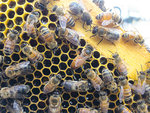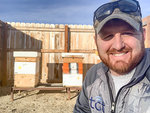Cloudy, 53° F
A request by a Powell resident to change city ordinances to permit hobbyist beekeeping has led to a series of discussions over the course of three city council meetings, with further discussion to …
This item is available in full to subscribers.
The Powell Tribune has expanded its online content. To continue reading, you will need to either log in to your subscriber account, or purchase a subscription.
If you are a current print subscriber, you can set up a free web account by clicking here.
If you already have a web account, but need to reset it, you can do so by clicking here.
If you would like to purchase a subscription click here.
Please log in to continue |
|


A request by a Powell resident to change city ordinances to permit hobbyist beekeeping has led to a series of discussions over the course of three city council meetings, with further discussion to follow.
At the most recent meeting, on March 2, the council invited a local hobbyist and Wyoming Department of Agriculture staffers involved in inspecting and regulating beekeeping in the state to provide more information on what to expect if Powell permitted the practice inside city limits.
The discussion didn’t result in any decisions on what to do with the city ordinances; the request from resident Steve Nickles will be considered again at a later meeting.
Among the concerns about permitting beekeeping in Powell is that neighbors will be inundated with the stinging insects.
Colter VanLake, a hobbyist beekeeper in rural Powell, said in the four years he’s been beekeeping, none of his kids or his wife have been stung.
Usually, VanLake can maintain the hives without any protective gear. In the course of removing frames from the hive, VanLake said he’ll sometimes squish bees with his fingers and get stung, but otherwise, the bees rarely attack.
Kelsey Hart, area inspection specialist with the agriculture department, said some species of honeybees are aggressive, but bees are typically far less aggressive than wasps or hornets.
Hart said the average bee hive can contain up to 65,000 bees, and the state permits hobbyists to have up to five hives.
VanLake started with two hives and now has three. To keep the bees healthy, VanLake said, the hives require a lot of work.
“It keeps you busy,” he said.
VanLake mainly got into beekeeping as a personal interest; the honey — about 15 to 18 gallons per year — is just an extra benefit of the practice, he said.
State statutes require beekeepers, including hobbyists, to register with the state. Hart said there are about 359 registered beekeepers in Wyoming, of which 233 are hobbyists.
Commercial beekeepers face a number of other restrictions, including a limitation on placing hives within 2 miles of another commercial hive — a law that helps minimize the spread of disease among the insects.
The state also requires hive owners to make sure the bees have a source of food and water, which helps keep bees from annoying neighbors.
“If they’re not properly being fed and watered, they can venture out to find their pollination and water sources,” Hart explained, saying they can travel as far as 3 miles. Otherwise, she said bees tend to stay close to their hives, as that’s “where they’re most comfortable.”
Hart also told the council how vital bees are to pollination in the area.
Councilor Scott Mangold said Nickles’ interest in beekeeping coincided with his wife’s love of growing flowers, as the bees would help pollinate those plants. Mangold asked Hart if, absent hives in the yard, the flowers would still get pollinated.
With bees traveling up to 3 miles, Hart said it’s likely bees from other hives, including natural ones, would still pollinate the flowers.
Mangold asked if it were possible to limit a hive to just a couple hundred bees to pollinate the flowers in a single yard, but Hart said the 65,000 population is needed to maintain a hive.
Councilor Steve Lensegrav asked if other towns that permit beekeeping in the city limits, such as Cheyenne and Casper, have many registered hive owners. Hart said there were quite a few beekeepers in those cities but pointed out they are much larger than Powell. She also said there’s been a definite increase in hobbyist beekeeping.
Councilor Jim Hillberry asked about the frequency the hives are inspected. While the commercial beekeepers are inspected annually, hobbyists are only inspected when there are complaints. Hart said there were only a “handful” of complaints every year.
The question for Councilor Floyd Young was how many hobbyists are around schools. While registered beekeepers do provide GPS locations for their hives, Hart said the state doesn’t have data showing where they are in relation to schools.
The council also had questions about how mosquito spraying impacts hives. Cindy Fulton, supervisor and pesticide enforcement with the state agriculture department, said Wyoming’s registration system makes it easy to notify hive owners when spraying is done in the vicinity of their hives. That shifts responsibility to the hive owners to protect their bees.
“Our state law is regarded well nationally,” she said.
Fulton added that there is no scientific proof that herbicides used in agriculture have any detrimental impacts to bee populations.
After the presentations, the council discussed how they might proceed. Wetzel suggested the five hive limit imposed by state law on hobbyists may be too high for Powell, and Hillberry mentioned that constituents have told him they object to having hives around town.
Councilors still didn’t feel ready to make any decisions on Nickles’ request and so they tabled it.